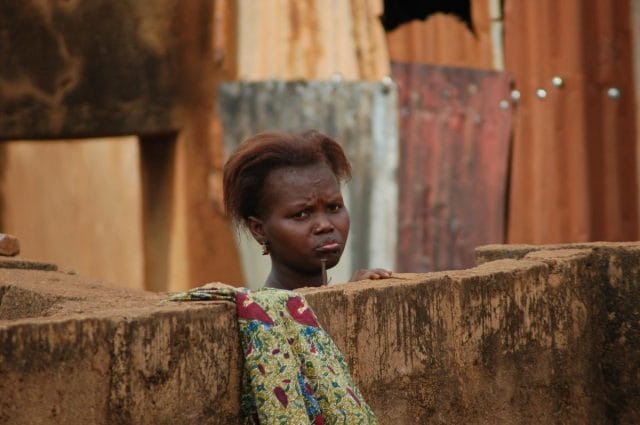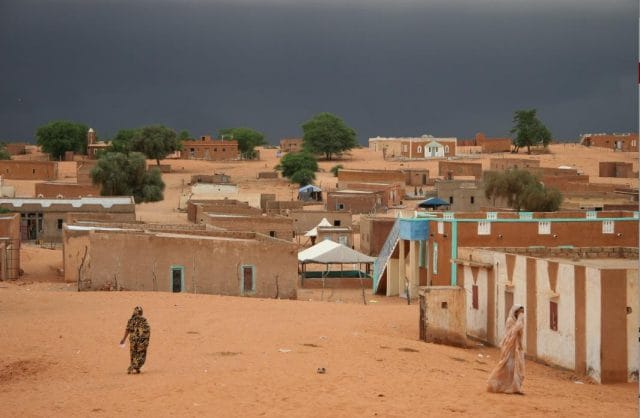
Source: Joachim Huber (Flickr)
Abdel Nasser Ould Ethmane received his first slave when he was seven years old. It was the afternoon of his circumcision — his right of passage into early manhood — and he had the liberty to pick any gift imaginable. “It was as if I were picking out a toy,” he recalls. “It was as if he were a thing — a thing that pleased me.”
With the point of a finger, Abdel selected a small boy with almond eyes and skin the color of coal to be his slave until death.
Abdel is a resident of the Islamic Republic of Mauritania in western North Africa, where this is commonplace. In fact, Mauritania has the highest proportional population of slaves in the world: as many as 680,000 of the country’s 3.4 million people — 20% of the population — are considered “property.”
History of Slavery in Mauritania
Mauritanian slave trade can be traced back nearly 2,000 years. Arab slave traders in Western Africa began capturing darker-skinned men and women from sub-Saharan Africa and forcing them into unpaid labor as early as the year 200.
Slavery has been outlawed four times in Mauritania’s history. In 1905, French colonial rule declared an end to the practice, but abolition never took hold; in 1948, the United Nations’ Universal Declaration of Human Rights abolished slavery internationally; in 1961 — just a year after gaining independence from France — Mauritania adopted a new constitution in which it clearly delineated slavery as an illegal practice.
In 1981, Mauritania “officially” abolished slavery and declared that it no longer existed; the country was the last in the world to do so. But according to Kevin Bales, author of Disposable People: New Slavery in the Global Economy, this was “essentially a public-relations exercise,” and “no one bothered to tell the slaves about it.”
Under continued scrutiny, the country passed a law in 2007 that criminalized slavery and threatened to punish violators with a 10 year prison sentence. To this day, only one case against a slave owner has ended in a conviction; the accused, Oumoulmoumnine Mint Bakar Vall, received a reduced two year sentence and was released after only four months, upon paying a 200,000 ouguiya ($677) fine. The anti-slavery activists who brought the case to the attention of the government were falsely imprisoned and served a six month sentence — more than the man they fought to bring to justice.
For years, the Government of Mauritania adamantly denied that slavery was an issue; today, its leaders have made efforts to raise awareness of human trafficking and slavery, but do little in way of enforcement. The US Department of State reports that the Mauritanian government and NGOs “identified nearly 2,000 suspected victims” in 2013, but “did not initiate any prosecutions.” The report also claims that adequate protective services were not provided for identified victims, and they often had to return to a subjugated lifestyle.
Prevalence of Slavery

Source: Wikipedia Commons
Today, as many as 30 million men, women, and children are enslaved worldwide. Nearly half are in India, but if we consider slavery as a percentage of the population, Mauritania has no equal.
All of the experts who have studied slavery in Mauritania agree on one thing: the number of current day slaves is difficult to quantify, due to the largely secretive nature of the trade. The most conservative source estimates that one out of every twenty-five people in Mauritania is enslaved; The United Nations states that nearly 20% of the country’s population, or 680,000 people, are “real slaves” — a term coined by Gulnara Shahinian, the UN’s special rapporteur on contemporary forms of slavery. “Real slavery” includes a variety of subjugated slave classes, explains Shahinian:
“The mandate on contemporary forms of slavery includes but is not limited to issues such as: debt bondage, serfdom, forced labour, child slavery, sexual slavery, and the sale of wives. Even when abolished, slavery leaves traces. It can persist as a state of mind- among victims and their descendants and among the inheritors of those who practiced it long after it has formally ended.”
Considering these figures, Mauritania has the highest proportional percentage of slavery in the world; Haiti, the second most enslaved country, isn’t even close:
Data collected from Slavery Index and United Nations
![]()
Mauritania’s slavery epidemic involves three ethnic groups: White Moors (the lighter-skinned power class, who control most of the country’s wealth, the government, and the police force), Black Moors (darker-skinned descendants of sub-Saharan Africa), and the Haratine (Black Moor slaves who have been freed, but often still exist “somewhere on the spectrum between slavery and freedom”).
Historically, Black Moors and Haratine have remained enslaved by White Moors for two reasons: extreme poverty, and rigid customs.
Mauritania is one of the poorest countries in the world, with a per capita income of $443. Nearly 30% of its population lives on less than $1 a day; 70% live on less than $2 a day. Even a large percentage of slave owners are poor and rely on free labor to get by. Amnesty International estimates that “some 300,000 freed slaves continue to serve their former masters because of economic dependence.”
But slavery is also steeped in Mauritanian tradition; under castes rooted in ancestral master-slave relationships, slaves have accepted their circumstance as a normal course of life.
Chattel slavery — where one person is the property of another — is perhaps the most stereotypical form of slavery, and is similar to pre-abolition slavery in the United States. It has existed in Mauritania for over 800 years, and Amnesty estimates 90,000 Haratine fall into this category.
For these slaves, life is unimaginable. When purchased — usually for around $90 (US) — they are held for generations by slave-holding families, and forced to work without pay “as cattle herders and domestic servants.” Any children born to enslaved mothers automatically become the property of owners; more than often, they are killed — it is more convenient and cheaper for an owner to buy a new slave than to raise one from childhood. Child slaves are forced to take to the streets and beg for food; they must earn a daily quota to pay their masters. They are forced into marriages at the whim of their owners, and can be “given as gifts, bought and sold, or presented to the poor as charity.”
Human trafficking is also a major issue: women and girls are forced into prostitution, and even shipped to the Middle East as international sex slaves. Here, “men from Middle Eastern countries use legally contracted ‘temporary marriages’ as a means to sexually exploit young girls and women.”
Looking Forward

Source: Laura Junquera (Flickr)
There is an old Mauritanian saying used to preach subservience: “Paradise is under your master’s foot.” Just as the transatlantic slave trade was justified using Christianity, slavery has been perpetuated in Mauritania under the guise of tradition.
“Westerners think of slaves as people in chains,” says Boubacar Messaoud, head of activist group SOS-Slave. “Slaves here have no need to be chained up because they are educated in submission … They are chained in their heads.”
Messaoud, a child of two slaves started SOS internally in 1995. Other major campaigns against slavery exist as well: Anti-Slavery International operates a large-scale initiative, the UN has launched a similar human rights campaign, and a smattering of NGOs continue to combat various forms of injustice.
Another man was involved in founding SOS-Slaves. Abdel — the boy who bought his first slave many years ago — had a change of heart in his early 20s after receiving an education, and helped Massaoud launch the program. When he tried to free his own slave, the man didn’t even have a concept of what freedom was. Certainly, education seems to be an integral step toward eradicating slavery.
Perched in the outer thralls of the Sahara Desert is a small school set up by Anti-Slavery International. Inside, 30 freed slaves learn various trades — sewing, cooking, dying fabric. The program sets up slaves with work and, in some cases, helps them seek refuge abroad. One female graduate now living in Ohio had a message to relay to the slaves in her home country:
“The day will come when you are free but you must take a stand. It will not do to sit back and wait. You must rise up against slavery … You won’t get anywhere as a slave. You must demand liberty. No one can give you freedom if you don’t truly want freedom.”
This post was written by Zachary Crockett. Follow him on Twitter here, or Google Plus here.



